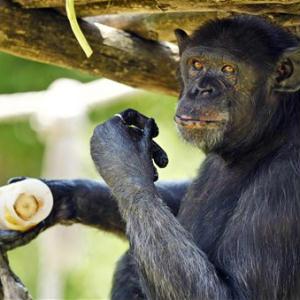
FAITH LAPIDUS: This is SCIENCE IN THE NEWS, in VOA Special English. I'm Faith Lapidus.
BOB DOUGHTY: And I'm Bob Doughty. Today, we will tell about a possible biological test for autism. We also will talk about some allergic reactions and their causes. And we will tell about an investigation of weight gain in animals.
(MUSIC)
FAITH LAPIDUS: Autism affects social and communication skills. It usually first appears in young children. Doctors currently identify autism disorders by observing behavior. Now, researchers in the United States think they have found a biological test for autism.
A team from Harvard University in Massachusetts and the University of Utah developed the test. It uses an MRI or magnetic resonance imaging machine to look for abnormalities in the brain. Other studies have not shown major structural differences between the brains of autistic people and those without autism.
BOB DOUGHTY: However, the latest study did not look at the large structures of the brain. Harvard's Nicholas Lange says the team looked instead at the chemical and electrical pathways that link the different parts of the brain.
NICOLAS LANGE: "The brain may be OK, the parts that do the work may be OK. But the wiring, the cables between the points in the brain, one to another, may be disrupted in some way."
BOB DOUGHTY: The researchers did MRI scans on 60 males between the ages of eight and 26. Thirty of them had been identified as having mild autism, a form also known as high-functioning autism.
The researchers looked at the connections in two areas of the brain that control language and social behavior. They used a method called diffusion tensor imaging. This way they could observe microscopic fibers to see how well the brain circuitry was organized.
FAITH LAPIDUS: Nicholas Lange says the pictures showed a clear difference between the people with autism and those without. He compared it to spaghetti.
NICHOLAS LANGE: "There's a bundle of uncooked spaghetti and there's clear a directionality to that. It's nice and well-organized, as opposed to a cooked bowl of spaghetti that's just a tangle of -- it looks like spaghetti. And that's the way the wiring can be. It can either be very tangled or it can be very organized."
FAITH LAPIDUS: The researchers say the tests were able to predict with 94 percent accuracy which of the people had been found to have autism. The researchers repeated their testing with other subjects and got equally strong results. The results appeared in the journal Autism Research.
Doctor Lange says the test is not ready yet for general use. The study was small and only involved males. It also used older children and adults.
Doctor Lange says that, in time, the test might be able to identify autism in children under three. Three is currently the youngest age at which most doctors will diagnose an autism disorder. But most parents begin to suspect a problem by the age of two.
(MUSIC)
BOB DOUGHTY: Seasonal allergies can have a huge effect on worker productivity. The United States loses an estimated 700 million dollars in productivity each year because of allergies. And Americans spend billions more on allergy medications and treatments.
An allergy is an unusually strong reaction to a substance. Many things can cause allergic reactions. The most common cause is pollen from flowering plants and trees. Other causes can include organisms like dust mites or mold. Chemicals, plants and dead skin particles from animals can cause an allergic reaction. So can insect bites, some foods and changes in temperature.
The most common kind of allergic reaction is itchy, watery eyes and a blocked or watery nose. Allergies can cause red, itchy skin. Some reactions can be life-threatening; for example, when breathing passages become blocked.

FAITH LAPIDUS: Springtime can be beautiful in the southeastern United States. Every tree and plant seems to be flowering. But all that beauty comes at a heavy price. The state of Tennessee has been called one of the worst places in the country to live if you suffer from seasonal allergies. The reason is its climate and vegetation.
Bruce Lyon, a physical trainer, is in great physical shape. However, all his strength and energy seems to melt away when spring arrives.
BRUCE LYON: "This is the saddest thing. On the most beautiful days, especially when the spring starts around and you're ready to get out and do something. Then I'm so tired I didn't even feel like getting out and doing anything. I felt like, I think I'm going to go back home and sleep."
FAITH LAPIDUS: It is hard to believe that something as small as a grain of pollen can cause so much suffering. But the effect can be overwhelming. Allergist Burt Wolf says this year was worse than usual.
BURT WOLF: "I mean we don't even need a calendar for a certain segment of our patient population. We know when allergy season begins for them and how it affects them. But this year many of our patients were calling two or three weeks earlier."
FAITH LAPIDUS: Doctor Wolf believes rising temperatures in Earth's atmosphere may be responsible.
BURT WOLF: "Increased temperature to a certain degree and also increased CO2, or so-called greenhouse effect. These things, in some studies, have shown to increase pollen over the last decades, 60 to 90 percent."
FAITH LAPIDUS: Allergies cannot be cured but the physical reactions can be treated. Doctor Wolf says several new medicines have reached the market in recent years and allergy injections often work for more severe cases.
(MUSIC)
BOB DOUGHTY: Like many people, animals are getting fatter. At least that is the finding of a report in the British publication, Proceedings of the Royal Society B. David Allison of the University of Alabama at Birmingham wrote the report.
Weight gain is often blamed on too much fatty food and too little exercise. But Professor Allison and his research team say there may be reasons other than these traditional ones.
The researchers studied body weight changes in more than 20,000 animals. The animals came from 24 populations of eight different species, or groups, across North America.
FAITH LAPIDUS: Each animal was said to be in early middle age for its species. Yann Klimentidis worked on the study with David Allison. Mr. Klimentidis said they considered animals with at least two body weight measurements in the past 60 years. At least one measurement was made in the last half of the 20th century. One exception was non-laboratory rats. Their body weight was first measured in 1948.
FAITH LAPIDUS: The study involved creatures as different as large animals in research centers and rats living free around Baltimore, Maryland. All the animals demonstrated major gains in average body weight over ten-year periods.
For example, chimpanzees in captivity showed a 33 percent increase in weight each decade. Laboratory marmosets increased weight at a rate of nine percent per ten-year period. Laboratory mice became fatter at a rate of ten percent. And laboratory rats increased at a three-percent rate.
The study also showed that pet animals are fatter. The average house cat weighed almost ten percent more each decade. Dogs' weight increased at a rate of three percent.
BOB DOUGHTY: A virus called AD36 could be involved in the gain. Its presence has been connected to obesity in adults. And the team says changes in time spent in light or dark environments influences eating habits.
David Allison says earlier studies found that light differences may be part of the reason for fatter animals. For example, one kind of animal -- the lemming – experiences body weight changes at different times of the year.
DAVID ALLISON: "We know that light affects weight gain in species like lemmings that gain and lose a great deal of weight in different times of the year, when there is much sunlight versus little sunlight. That is the natural thing for them. So our brains are responsive to light and in ways that may relate to body weight."
BOB DOUGHTY: David Allison says changes in environmental temperature affect weight in both people and animals. The body produces more energy to keep itself warm in the cold. But it produces less energy to cool itself in the heat.
DAVID ALLISON: "That all other things being equal, if you put a warm-blooded species like humans or mice or dogs into a colder environment, then they will need to expend more energy to maintain their body temperature. And so, being in a cold environment increases energy expenditure, and if you eat the exact same amount, will lead to lesser body weight. Being in a warmer environment, up to a point, will lead to decreased energy expenditure and therefore, at the same amount of food intake, weight gain."
BOB DOUGHTY: Yann Klimentidis says knowing causes of weight gain in animals may help researchers as they deal with overweight human beings.
(MUSIC)
FAITH LAPIDUS: This SCIENCE IN THE NEWS was written by Avi Arditti, Brianna Blake and Jerilyn Watson. Our producer was June Simms. I'm Faith Lapidus.
BOB DOUGHTY: And I'm Bob Doughty. Listen again next week for more news about science in Special English on the Voice of America.
marmoset: a small monkey with a long thick tail, that lives in Central and South America 狨(栖于中南美洲的小长尾猴)
lemming: a small animal like a mouse, that lives in cold northern countries. Sometimes large groups of lemmings migrate in search of food. Many of them die on these journeys and there is a popular belief that lemmings kill themselves by jumping off cliffs. 旅鼠(栖居北方寒冷国家)
Autism test could use images of brain
US Doctor Group Urges Autism Testing for All Babies
(来源:VOA 编辑:崔旭燕)
